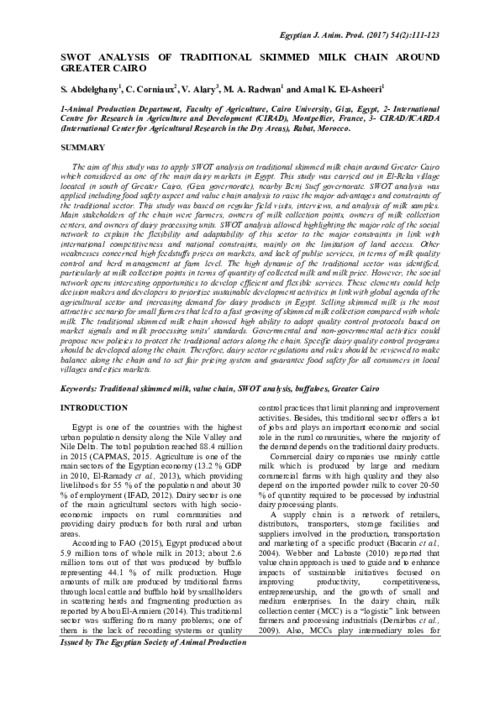SWOT Analysis of traditional skimmed milk chain around greater Cairo
Abstract
The aim of this study was to apply SWOT analysis on traditional skimmed milk chain around Greater Cairo
which considered as one of the main dairy markets in Egypt. This study was carried out in El-Reka village
located in south of Greater Cairo, (Giza governorate), nearby Beni Suef governorate. SWOT analysis was
applied including food safety aspect and value chain analysis to raise the major advantages and constraints of
the traditional sector. This study was based on regular field visits, interviews, and analysis of milk samples.
Main stakeholders of the chain were farmers, owners of milk collection points, owners of milk collection
centers, and owners of dairy processing units. SWOT analysis allowed highlighting the major role of the social
network to explain the flexibility and adaptability of this sector to the major constraints in link with
international competitiveness and national constraints, mainly on the limitation of land access. Other
weaknesses concerned high feedstuffs prices on markets, and lack of public services, in terms of milk quality
control and herd management at farm level. The high dynamic of the traditional sector was identified,
particularly at milk collection points in terms of quantity of collected milk and milk price. However, the social
network opens interesting opportunities to develop efficient and flexible services. These elements could help
decision makers and developers to prioritize sustainable development activities in link with global agenda of the
agricultural sector and increasing demand for dairy products in Egypt. Selling skimmed milk is the most
attractive scenario for small farmers that led to a fast growing of skimmed milk collection compared with whole
milk. The traditional skimmed milk chain showed high ability to adopt quality control protocols based on
market signals and milk processing units' standards. Governmental and non-governmental activities could
propose new policies to protect the traditional actors along the chain. Specific dairy quality control programs
should be developed along the chain. Therefore, dairy sector regulations and rules should be reviewed to make
balance along the chain and to set fair pricing system and guarantee food safety for all consumers in local
villages and cities markets

